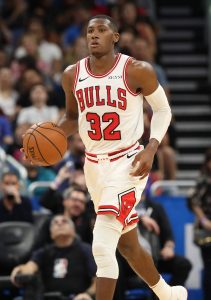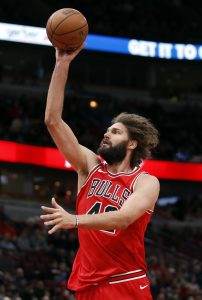The Bulls entered the 2018/19 season hoping to take the sort of steps forward that fellow rebuilding teams like the Kings and Hawks did. Instead, the team got off to a slow start, fired head coach Fred Hoiberg, and installed Jim Boylen in his place en route to a 22-60 finish.
Having doubled down on Boylen with a multiyear contract extension, the Bulls will enter the 2019/20 campaign counting on another year of prospect development – and Boylen’s bond with his players – to begin translating to on-court success.
Here are five key questions facing the franchise this summer:
1. How will the Bulls address their point guard position?
Kris Dunn was one of the key components of the trade that sent Jimmy Butler from Chicago to Minnesota in 2017, but unlike the two other players the Bulls acquired in that swap – Zach LaVine and Lauri Markkanen – Dunn hasn’t established himself as a crucial piece of the team’s future.
After a pair of up-and-down seasons in Chicago, Dunn will at the very least find himself facing competition for his starting point guard job this fall, if he’s not usurped outright by a newcomer. It’ll be a big offseason for the former No. 5 overall pick, who will be extension-eligible for the first time.
With about $20MM in projected cap room at their disposal, the Bulls have the flexibility to pursue a veteran on the free agent market to address the point guard spot. They won’t be in play for Kyrie Irving, Kemba Walker, or D’Angelo Russell, and investing big money in a second-tier restricted free agent like Terry Rozier may be ill-advised, but there are a number of options available.
All the way back in January, one report identified Ricky Rubio and Darren Collison as two free-agents-to-be who will be of interest to the Bulls. Collison’s teammate Cory Joseph could be another option, as could Chicago native Patrick Beverley.
Two of the more intriguing players to watch on this front are Derrick Rose and Rajon Rondo — Rose, is of course a former Bulls MVP, while Rondo was well-liked by the team’s young players during his lone year in Chicago. A reunion with either player might not be out of the question.
Of course, the Bulls hold the No. 7 overall pick in the draft and could use it to draft a point guard. However, Ja Morant appears likely to come off the board at No. 2, and Darius Garland may not be available for Chicago either. After those two prospects, there are probably no true point guards worth considering that high in the draft.
2. How will the Bulls use the No. 7 pick?
While Morant and Garland may be selected within the first six picks, there’s a decent chance that another guard will be on the board for the Bulls at No. 7. North Carolina’s Coby White is more of a combo guard than a full-fledged point guard, but he could be a fit for Chicago. That’s certainly a popular theory among experts — Mark Strotman of NBC Sports Chicago recently rounded up 22 separate post-lottery mock drafts and found that 15 of them have White going to the Bulls.
ESPN’s Jonathan Givony is among those who views the UNC guard as a good fit for the Bulls, writing in his latest mock draft that White’s ball-handling and shooting ability would allow him to play alongside either Dunn or LaVine as the team figures out which of its guards are long-term keepers.
On the other hand, in his scouting report of White, Givony points out that the 19-year-old is a “wild decision-maker” who has made strides as a passer but struggles with over-dribbling and dealing with aggressive ball pressure. In other words, if the Bulls do draft him, they can’t comfortably pencil in him as their point guard of the future quite yet.
There are other options available for Chicago at No. 7. Texas Tech swingman Jarrett Culver or Virginia forward De’Andre Hunter would be solid picks if they’re still on the board. In The Athletic’s most recent mock draft, Darnell Mayberry has the Bulls nabbing Culver, observing that it wouldn’t hurt to have another two-way wing on the roster. In Mayberry’s view, it makes more sense for the club to fill its point guard need in free agency.
3. Will the Bulls bring back any of their free agents?
A year ago, the Bulls had to negotiate a new long-term contract with LaVine when he reached restricted free agency. This time around, there are no players who absolutely must be re-signed. Unrestricted free agent big man Robin Lopez and RFAs Wayne Selden and Ryan Arcidiacono headline Chicago’s relatively small group of free agents this summer.
 Based on the team’s timeline for contention, it seems like Selden and Arcidiacono are the players more likely to be back, but we shouldn’t entirely rule out a new deal for Lopez. After all, the lottery-bound Bulls could have traded him at the deadline or bought him out before March 1, but opted to keep him around instead. He’s unlikely to earn $14MM+ again, so if the Bulls have some cap room left over, perhaps they’ll explore keeping him in the mix as a veteran leader on a young roster.
Based on the team’s timeline for contention, it seems like Selden and Arcidiacono are the players more likely to be back, but we shouldn’t entirely rule out a new deal for Lopez. After all, the lottery-bound Bulls could have traded him at the deadline or bought him out before March 1, but opted to keep him around instead. He’s unlikely to earn $14MM+ again, so if the Bulls have some cap room left over, perhaps they’ll explore keeping him in the mix as a veteran leader on a young roster.
Of those three players though, Arcidiacono looks to me like the best bet to return. The 25-year-old was a surprisingly effective part of Chicago’s rotation in 2018/19, averaging 6.7 PPG, 3.3 APG, and 2.7 RPG on .447/.373/.873 shooting in 81 games (32 starts). He’s also coming off a minimum salary contract, so the Bulls will be able to keep his very modest cap hold on the books and then go over the cap to re-sign him once they use their cap room.
4. Will the Bulls add more shooting?
No NBA team made fewer 3-pointers in 2018/19 than the Bulls, whose 9.1 threes per game ranked dead-last in the league. Although the deadline acquisition of Otto Porter should ostensibly have helped boost that number, Chicago’s stats were even worse after the All-Star break (8.3 threes per game).
Getting Denzel Valentine back in 2019/20 should give the Bulls another outside threat, and the team will expect more from 2018 first-rounder Chandler Hutchison, who struggled from beyond the arc after posting good shooting numbers at Boise State.
Still, it wasn’t just a matter of the team’s personnel. Up until Hoiberg’s ouster, the Bulls were launching 29.3 threes per game, a below-average rate, but one that was more toward the middle of the pack. Under Boylen, that number declined to 24.5 attempts per game, easily the NBA’s lowest mark.
Boylen’s offensive philosophy has faced criticism for being old-fashioned, and the club’s low rate of outside shots is part of that. The key question for the Bulls is whether they’ll allow that philosophy to dictate the sort of roster additions they pursue, or whether the front office will still look to add a strong shooter or two to the mix. Doing so could force Boylen to modernize his offensive attack a little, making the Bulls a more dangerous team.
5. What are the expectations for John Paxson and Gar Forman?
While we’re on the subject of the front office, it’s worth questioning what the expectations are for the Bulls executives known collectively as “GarPax.”
Since appearing in the Eastern Semifinals in 2015, the team has seen its win total decline for four consecutive years. It’s time for that trend to end and start moving in the other direction, but how quickly does Bulls ownership expect it to happen?
The Reinsdorfs have been far more patient with Paxson and Forman than most Bulls fans have, giving them endorsement after endorsement when questioned about their faith in the front office. The coming year could represent a crucial turning point though.
After a turbulent 2018/19 season, the Bulls’ rebuild may be in trouble if they don’t start taking positive steps forward in ’19/20. Will team ownership see it that way too, or will Paxson and Forman continue to get all the time they need to build a roster capable of playoff contention?
Check out the Chicago Bulls’ offseason salary cap outlook right here.
Salary information from Basketball Insiders was used in the creation of this post. Photos courtesy of USA Today Sports Images.

The lemmings have great outside shooters, too bad their games are indoors
Do the Bulls want to win a championship? Or are they just interested in being 500?
Why do you think it has to be one or the other? You have to get to .500 before you win a championship. You don’t go from the top of the draft to the top of the NBA in one year. I think Philly and Boston fans are learning that right now.
Find a dumb buyer for Kris Dunn. Maybe you have to attach an unprotected 2, but get it “Dunn”. Sign Ricky Rubio to a two year deal that coincides with Boylen deal, then select DeAndre Hunter who has a strong work ethic and NBA ready body. He’s going to be a strong defender in this leader. He won’t be an offensive scoring machine but I project his player comp to OPJ/Jaylen Brown. If they don’t like Hunter then should trade the pick for an emerging player who can strengthen the bench we have and also can play starter’s minutes in case someone goes down. We lack depth as a roster in terms of who can step in if someone goes down. The best NBA rosters/teams this year (besides Dubs) have had depth 1-13 so they can rest or take their time with minutes load. We don’t have that luxury. Also, I would sign Selden Jr, he showed me in spurts that he can be a decent shooter outside and play a good 10-15 minute clip as a bench scorer. Let go of RoLo. Arch had a decent year but he has defensive flaws and liabilities with his foot speed and 15 year old boyish physique. I still don’t think The three stooges (Jerry, John, Gar) know how to build a proper rebuild. White Sox (another Jerry owned team) is actually having success in their rebuild despite injuries to numerous players on their minor league team. NBA should take a hard look at how Jerry conducts business and if he’s 100% faithful to building a winner. I don’t see it. He’s just the luckiest owner in sports history.